Policy Issues
The overall policy framework for the Peacebuilding Support Office’s (PBSO) engagement is outlined in the Secretary-General’s reports on “Peacebuilding in the immediate aftermath of conflict”, the 2010 progress report and the 2012 and 2014 reports on "Peacebuilding in the aftermath of conflict". The reports focus on the challenges that post-conflict countries and the international community face in the immediate aftermath of conflict. In order to translate the reports’ recommendations into real change in post-conflict countries, PBSO actively participates in policy discussions and organizes thematic events on most pressing peacebuilding topics. A few are outlined here:
Practice Note on Young People's Participation in Peacebuilding
The Working Group on Youth and Peacebuilding, co-chaired by PBSO, Search for Common Ground and UNOY, developed a Practice Note on Young People’s Participation in Peacebuilding that is being released in January 2016. The primary objective of this Practice Note is to inform policymakers and donors of key strategic and programming considerations for supporting young people’s participation to peacebuilding. Specifically, this Note has been developed to:
- offer evidence-based, promising practices in youth peacebuilding in the field;
- advance the understanding of donors and policy-makers of complex and often interconnected policy and programme considerations for more holistic support to youth peacebuilding interventions, and;
- enhance the effectiveness of policies and funding strategies of bilateral and multilateral donors and agencies supporting youth peacebuilding interventions.
The Note explores promising practices and provides overarching recommendations for donors, policy-makers and planners.
Global Forum on Youth, Peace and Security
The Global Forum on Youth, Peace and Security, held in Amman, Jordan, on 21-22 August 2015, gathered hundreds of participants – from Member States, the United Nations, civil society, youth organizations and academia – to discuss the vital role that young people play in sustaining peace. The Amman Youth Declaration was adopted during the Forum. It calls on the Security Council to adopt a resolution on Youth, Peace and Security, and highlights four key areas where the international community should partner with young people:
- Participation and leadership in peace and security issues;
- Preventing violence and building peace;
- Promoting gender equality; and
- Young people’s socioeconomic empowerment.
The Global Forum was hosted by the Hashemite Kingdom of Jordan under the Patronage of His Royal Highness Crown Prince Al Hussein bin Abdullah II, and co-organized by the United Nations represented, on behalf of the Inter-Agency Network on Youth Development (IANYD), by the Office of the Secretary-General Envoy on Youth (OSGEY), the Peacebuilding Support Office (PBSO), UNDP and UNFPA, in partnership with Search for Common Ground and the United Network of Young Peacebuilders. PBSO undertook the overall coordination for the substantive organization of the Forum.
Click here for the final report of the Forum.
For the full text of the Declaration and for more information about the Forum and its follow-up, please see www.youth4peace.info.
Guiding Principles on Young People's Participation in Peacebuilding
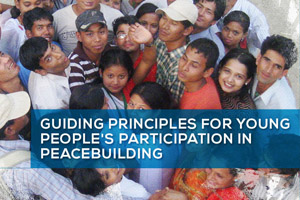
Photo: Search for Common Ground
The Guiding Principles on Young People's Participation in Peacebuilding, presented by PBSO and Search for Common Ground, were officially launched on 24 April 2014 at the International Peace Institute in New York. The release of these Guiding Principles marks a concerted effort by the United Nations and non-governmental organizations to promote youth as active stakeholders, participants, leaders and partners in peace processes. Please visit https://www.sfcg.org/guidingprinciples/ for more information.
Special Issue Newsletter: Natural Resources and Peacebuilding
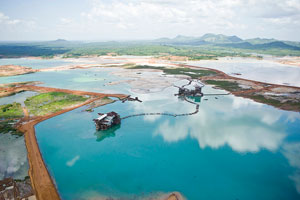
Aerial view of the rutile dredge and factory in the middle of a flooded rutile pit in south-central Sierra Leone.
UNEP Photo
The UN Peacebuilding Support Office (PBSO) in collaboration with the UN Environment Programme (UNEP) have issued a newsletter dedicated to natural resources and peacebuilding.
In many post-conflict countries and fragile contexts, natural resources are a cornerstone for peacebuilding and development. The challenge lies in sustainably transforming a country’s natural assets into employment, livelihoods, revenues, infrastructure and state services without creating new sources of conflict or causing major environmental damage.
This new Special Issue Newsletter is dedicated to exploring the latest developments at the field and policy levels in the UN system in addressing natural resources and peacebuilding. It aims to showcase and share lessons learned by practitioners and policy makers in an effort to support an emerging community of practice in this field.
Women, natural resources and peacebuilding
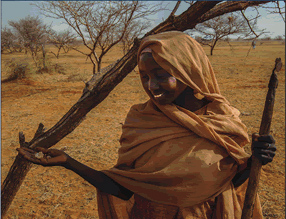
Gum arabic farmer from the Jawama’a tribe in El Darota, Northern Kordofan, Sudan, March 2006.
UNEP Photo/Grant Wroe-Street
The report Women and Natural Resources: Unlocking the Peacebuilding Potential urges governments and the international community to invest in the political and economic engagement of women in natural resource management and to end the entrenched discrimination that women face in accessing, owning and using critical natural resources in sustainable and productive ways.
Published jointly by the United Nations Environment Programme (UNEP), the United Nations Entity for Gender Equity and the Empowerment of Women (UN Women), the United Nations Development Programme (UNDP) and the United Nations Peacebuilding Support Office (PBSO), this report draws on field research from over 20 different countries and some 200 academic sources and institutions.
Women and Peacebuilding
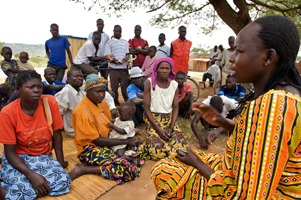
Democratic Republic of the Congo/UNICEF photo
Strengthening women’s participation in peacebuilding is high on the agenda of the PBSO. As outlined in the Secretary-General’s report on Women’s participation in peacebuilding women are crucial partners in shoring up three pillars of lasting peace: economic recovery, social cohesion and political legitimacy. PBSO together with UN Women are supporting the implementation of a seven-point Action Plan, the commitment of the United Nations to improve women’s situations in post-conflict countries.
On 29 April 2011, PBSO co-organized with UN Women a workshop on integrating a gender perspective into Post-Disaster and Post-Conflict Needs Assessments to ensure that women’s needs and a gender perspective are integrated into all post-disaster and post-conflict planning documents from early on. Also in 2011 the Peacebuilding Fund made a call for proposals for the most innovative gender-sensitive peacebuilding projects. A total of 7 projects have been chosen and will be funded with $5 million.
Strategic Planning and Peacebuilding
A variety of planning instruments are used to guide peacebuilding activities in countries emerging from conflict. These include the PBC’s Strategic Frameworks for Peacebuilding, the United Nations Development Assistance Frameworks (UNDAFs), Poverty Reduction Strategy Papers (PRSPs) and Integrated Strategic Frameworks (ISFs). There has been an evolving consensus on the need for coherence among these instruments. The PBSO has worked to advance this objective by supporting the Integrated Mission Planning Process (IMPP) and developing a new model for PBF Priority Plans that can be utilized as well by other funds and donors.
Lessons Learned and Good Practices
By incrementally capturing lessons learned and turning insights into recommendations on good practices, the field of peacebuilding will continuously improve. Therefore, PBSO strives to capture lessons learned by bringing practitioners, scholars and civil society together, to identify good practices that can have policy implications within a range of peacebuilding areas.
- In 2012, PBSO jointly with the Norwegian Resource Center on Peacebuilding (NOREF) hosted an event on reconciliation to explore such processes in post-conflict societies and to examine the roles and responsibilities of key stakeholders. Another important issue explored by the PBSO is natural resource management and peacebuilding, which is particularly relevant for all countries on the PBC agenda.
- On 14 March 2011, the UN’s Peacebuilding Support Office (PBSO) hosted a one-day workshop aimed at advancing debate within the UN system on both the meanings and practices of national ownership in the context of post-conflict peacebuilding. The workshop, co-organized by the PBSO, Wilfrid Laurier University and the City University of New York’s Ralph Bunche Institute for International Studies Financial support for the workshop was also provided by the Academic Council on the United Nations System (ACUNS) and the Social Sciences and Humanities Research Council of Canada (SSHRC), brought together practitioners from across the UN system, representatives of UN Member States, as well as academics and NGO representatives.
Civilian Capacities
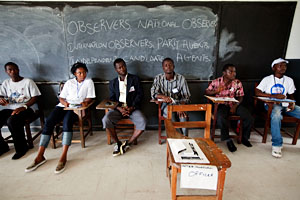
Liberians Go to Polls for Second Presidential Election.
UN Photo/Staton Winter
In May 2008, the Security Council invited the Secretary-General to provide advice on how the United Nations could better support national efforts to secure sustainable peace more rapidly and effectively, including in the areas of coordination, civilian deployment and financing. The Secretary-General’s report on “Peacebuilding in the immediate aftermath of conflict” in 2009 proposed a review that would analyse how the United Nations and the international community can help to broaden and deepen the pool of civilian experts to support the immediate capacity development needs of countries emerging from conflict. An independent Senior Advisory Group was appointed by the Secretary-General to undertake this review. The Peacebuilding Support Office hosted the small research team that supported the Senior Advisory Group. The report of the Senior Advisory Group was launched in March 2011. The implementation of the recommendations contained in the report is now led by the Department of Field Support. The Peacebuilding Commission and PBSO plan to be actively involved in supporting cooperation between countries of the South to build civilian capacities.
Measuring Peace Consolidation
The concept of measuring peace consolidation has come to embrace a broad range of peacebuilding contexts and activities. Security Council benchmarks now guide transitions in major peace processes in 10 of 27 countries and regions with field-based peacekeeping operations or political missions. Efforts to measure peace consolidation may also arise in relation to countries that have experienced violent conflict, but are not on the agenda of the Council, and in assessing progress toward objectives that a country has identified together with the Peacebuilding Commission. In parallel, there have been initiatives within the development community to define goals and related progress indicators for peacebuilding and statebuilding in fragile and conflict-affected states.
The United Nations Practitioners Guide to Benchmarking represents the first attempt to provide a common resource for practitioners across the UN system engaged in measuring peace consolidation. The handbook, whose development was facilitated by PBSO, identifies principles and methodologies that can be used in establishing benchmarking systems adapted to their specific contexts. PBSO has also supported efforts in this area by organizing with the International Peace Institute and the Norwegian Peacebuilding Centre (NOREF) a workshop on “Benchmarking Peace Consolidation”. Participants discussed trends and challenges in measuring peace consolidation, and examined how lessons learned can be applied to each other. They also discussed how the processes leading to the development of benchmarks, and monitoring and reporting against them, can be improved.
Join the conversation!